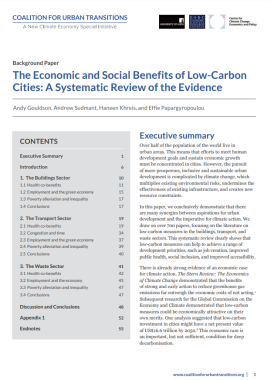
In this paper, we conclusively demonstrate that there are many synergies between aspirations for urban development and the imperative for climate action. We draw on over 700 papers, focusing on the literature on low-carbon measures in the buildings, transport, and waste sectors. This systematic review clearly shows that low-carbon measures can help to achieve a range of development priorities, such as job creation, improved public health, social inclusion, and improved accessibility.
Downloads
3.96 MB
1.98 MB
4.04 MB
2.03 MB
1.48 MB
2.76 MB
1.57 MB
11.47 MB
712.23 KB
919 KB
2.36 MB
1.87 MB
2.06 MB
1.54 MB
3.67 MB
1.52 MB
![]() The Economic and Social Benefits of Low-Carbon Cities: A Systematic Review of the Evidence
The Economic and Social Benefits of Low-Carbon Cities: A Systematic Review of the Evidence




















